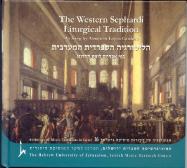(3476 results found)
'Et sha'are ratzon
… These are the first and last strophes of one of the most remarkable medieval Hebrew poems based on Midrashic themes that are related to the binding of Isaac. The poem …
Shema' qoli
… A famous baqqashah composed by R. Hai Gaon (d. 1038), one of the undisputed leaders of the Academy of Babylonia (today Iraq). It was adopted by the Sephardi communities as an introduction to the Yom …
Ahot qetannah
… In the Sephardi rite this piyyut attributed to Abraham Hazan Gerondi (13th century) is sung as the opening poem of the evening service of Rosh Hashanah. Cardozo's rendition is …
Atanu leḥalot panekha
… This is one of the oldest selihot melodies in the Sephardi ritual set to an ancient poem that dates back to the post-Talmudic period. The short poem consists of three …
Ben adam mah lekha nirdam
… This is the opening of the selihot service (early morning Penitential Prayers starting on the first day of the Hebrew month of Elul leading to Rosh Hashanah, the New …
Keter
… The qeddushah for the Mussaf (Additional) Service of the Sabbath is, like its counterpart in the morning prayers ( see above no. 14 ), adorned with old …
Va-ya'al Moshe me- 'arbot Mo'ab (Deuteronomy 34)
… This is the concluding chapter of Ve-zot haberakha, the last parashah (reading portion) of the Torah (Pentateuch). An example of biblical cantillation …
Mizmor le-david (Psalm 29)
… This is a rhythmicized example of the Hebrew psalmody used for the Sabbath eve (compare with no. 9 above). Each verse is … of two main motifs, expanded or contracted according to the length of each verse of the Psalm. This technique of …
Yevarekhekha
… Birkat kohanim ( Priestly Blessing) is one of the most moving and solemn moments of the morning liturgy on holidays and, in the Land of Israel, on Sabbaths, too (some Sephardi …
Naqdishakh ve-na'aritzakh
… The qeddushah is another liturgical text that receives special musical treatment in the Spanish-Portuguese tradition. Hazzanim of the Amsterdam and London Spanish- Portuguese synagogues were …



